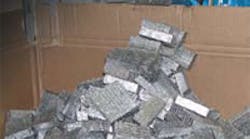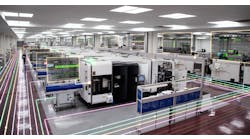The Chipmunk compactor turns Production Engineering’s 1.5 tons of 6061 aluminum chips produced daily (top) into manageable and profitable briquettes.
No one is sweeping chips under the rug at Production Engineering Corp. (www.pecorp.net). The shop generates 3,000 lb of aluminum chips on a daily basis and views chip generation, handling and disposition as key revenue factors in its jobs.
Production Engineering provides complex precision parts for the military and aerospace industries.
Clint Emmert, vice president of manufacturing, said chips are an important by-product of the shop’s manufacturing operation and are handled judiciously as a serious profit center.
In the last two years, the shop’s attention level to chips accelerated when the cost of aluminum skyrocketed, and scrap paybacks didn’t keep pace.
That was when the shop decided to install a Chipmunk chip compacting and recycling system from Kurt Manufacturing’s Chip Solutions Division (www.kurtchip.com).
While Production Engineering realized the benefits of such a system, what really sold the shop on the Chipmunk was the fact that Kurt used the system in its own facility to improve its method of dealing with aluminum chips.
“Kurt told us how it had realigned its own chip-processing operations by compacting chips and removing coolant from them during a big heat sink job they were machining,” Emmert said.
“Like us, Kurt previously handled its aluminum chips by loading them in luggers and having a nearby scrap dealer haul them almost daily. Payment was made at a flat rate, by the pound, and not at prevailing market rates that were traceable. That, plus they were being penalized on the scrap price because the chips were wet with machine coolant that had to be removed prior to the smelting process. There was also a $90 per trip charge,” he added.
A hydraulically driven in-feed auger on the Chipmunk separates unwanted solids from chips prior to compacting, which then removes 95 percent of residue coolant.
Kurt demonstrated to Production Engineering that it gained $180 an hour higher profit yield for the compacted chips versus not compacting them.
It also saved $8,000 a month in coolant costs by recovering, filtering and reusing it.
What Production Engineering liked about the Chipmunk was its simplistic design and its kinetic energy drive, which produces a high 8:1 compact ratio. The shop was also impressed with the system’s compact size, yet high-volume capability.
According to Kurt, the Chipmunk compacts chips more consistently and efficiently than conventional hydraulic compactors that require twice the horsepower. Its singleauger feeder operates from a powerful compression plate that forms and compresses wet chips into 3.5-in. by 1.250-in. continuous extruded briquettes.
The system’s power-saving 30-hp main motor is half the size required in conventional compactors that produce less than half of the Chipmunk’s output. With this power, the system compresses out 98 percent of residue coolant, which collects in a separate reservoir for filtration and reuse. In most installations, the Chipmunk pays for itself in a year or less.
“We improved the sale of our aluminum chips on average by $0.10 a pound using the Chipmunk compactor,” Emmert said.
“At 3,000 lb of chips a day, that’s significant to our profitability. And the higher return gets better as the price of aluminum increases. However, using the Chipmunk system is as much about improved plant processes as it is about getting more money out of scrap dealers,” he added.
“Having a rigid, flow-through process for chip handling improves a lot of things. Our workers, for example, understand that chips are a by-product and must be treated with as much care as finished parts. Nothing is wasted or discarded, and all chips and coolant are saved. The system itself takes up no more space than a standard sized machining center or less than the amount of space originally required for the old barrel method of accumulating chips,” Emmert said. After acquiring the Chipmunk compactor, Production Engineering found a new local recycler and changed its method of chip pickup, weighing and payment. Instead of 55-gallon barrels, the new recycler provides 40-in. by 48-in. by 48-in. gaylord boxes that hold 3,000 lb of compacted briquettes. The boxes arrive in a truck trailer that is left parked at Production Engineering’s loading dock for easy loading.
As the shop produces chips from various machining centers, it places them in movable carts that hold a cubic yard of chips and lines the carts up for loading into the Chipmunk. It takes a few minutes to load a day’s worth of chips, which are compacted into briquettes long before the day’s shift is over.
Once loaded, the Chipmunk operates unattended, automatically filling each box with dense, dry briquettes. When a gaylord box is filled, the shop weighs it and loads it into the truck trailer. No chips accumulate inside Production Engineering, either on the plant floor or at the back of the plant.
The shop pays no deduction for coolant residue in the briquettes because it has all been removed. The only charge from the recycler is $90 for pickup of each trailer load.






